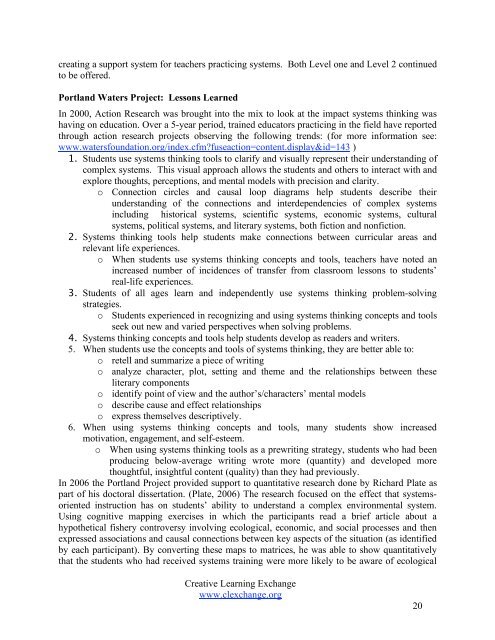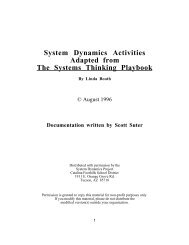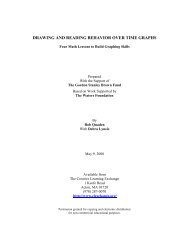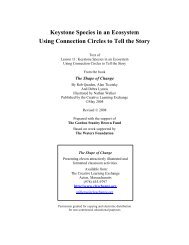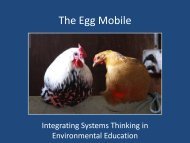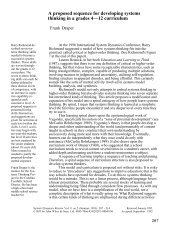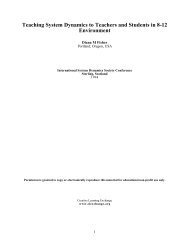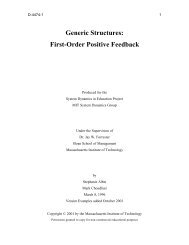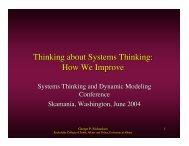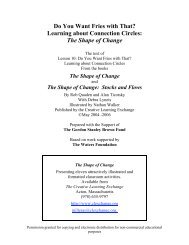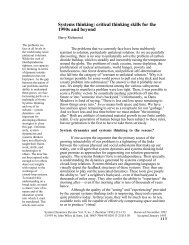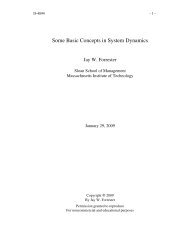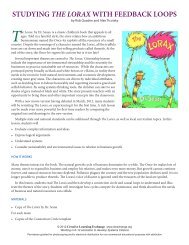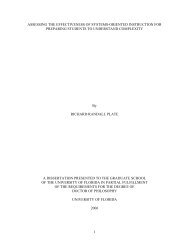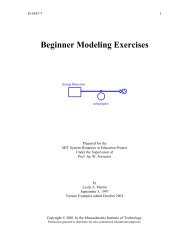System Dynamics in K-12 Education: Lessons Learned - Creative ...
System Dynamics in K-12 Education: Lessons Learned - Creative ...
System Dynamics in K-12 Education: Lessons Learned - Creative ...
You also want an ePaper? Increase the reach of your titles
YUMPU automatically turns print PDFs into web optimized ePapers that Google loves.
creat<strong>in</strong>g a support system for teachers practic<strong>in</strong>g systems. Both Level one and Level 2 cont<strong>in</strong>ued<br />
to be offered.<br />
Portland Waters Project: <strong>Lessons</strong> <strong>Learned</strong><br />
In 2000, Action Research was brought <strong>in</strong>to the mix to look at the impact systems th<strong>in</strong>k<strong>in</strong>g was<br />
hav<strong>in</strong>g on education. Over a 5-year period, tra<strong>in</strong>ed educators practic<strong>in</strong>g <strong>in</strong> the field have reported<br />
through action research projects observ<strong>in</strong>g the follow<strong>in</strong>g trends: (for more <strong>in</strong>formation see:<br />
www.watersfoundation.org/<strong>in</strong>dex.cfm?fuseaction=content.display&id=143 )<br />
1. Students use systems th<strong>in</strong>k<strong>in</strong>g tools to clarify and visually represent their understand<strong>in</strong>g of<br />
complex systems. This visual approach allows the students and others to <strong>in</strong>teract with and<br />
explore thoughts, perceptions, and mental models with precision and clarity.<br />
o Connection circles and causal loop diagrams help students describe their<br />
understand<strong>in</strong>g of the connections and <strong>in</strong>terdependencies of complex systems<br />
<strong>in</strong>clud<strong>in</strong>g historical systems, scientific systems, economic systems, cultural<br />
systems, political systems, and literary systems, both fiction and nonfiction.<br />
2. <strong>System</strong>s th<strong>in</strong>k<strong>in</strong>g tools help students make connections between curricular areas and<br />
relevant life experiences.<br />
o When students use systems th<strong>in</strong>k<strong>in</strong>g concepts and tools, teachers have noted an<br />
<strong>in</strong>creased number of <strong>in</strong>cidences of transfer from classroom lessons to students’<br />
real-life experiences.<br />
3. Students of all ages learn and <strong>in</strong>dependently use systems th<strong>in</strong>k<strong>in</strong>g problem-solv<strong>in</strong>g<br />
strategies.<br />
o Students experienced <strong>in</strong> recogniz<strong>in</strong>g and us<strong>in</strong>g systems th<strong>in</strong>k<strong>in</strong>g concepts and tools<br />
seek out new and varied perspectives when solv<strong>in</strong>g problems.<br />
4. <strong>System</strong>s th<strong>in</strong>k<strong>in</strong>g concepts and tools help students develop as readers and writers.<br />
5. When students use the concepts and tools of systems th<strong>in</strong>k<strong>in</strong>g, they are better able to:<br />
o retell and summarize a piece of writ<strong>in</strong>g<br />
o analyze character, plot, sett<strong>in</strong>g and theme and the relationships between these<br />
literary components<br />
o identify po<strong>in</strong>t of view and the author’s/characters’ mental models<br />
o describe cause and effect relationships<br />
o express themselves descriptively.<br />
6. When us<strong>in</strong>g systems th<strong>in</strong>k<strong>in</strong>g concepts and tools, many students show <strong>in</strong>creased<br />
motivation, engagement, and self-esteem.<br />
o When us<strong>in</strong>g systems th<strong>in</strong>k<strong>in</strong>g tools as a prewrit<strong>in</strong>g strategy, students who had been<br />
produc<strong>in</strong>g below-average writ<strong>in</strong>g wrote more (quantity) and developed more<br />
thoughtful, <strong>in</strong>sightful content (quality) than they had previously.<br />
In 2006 the Portland Project provided support to quantitative research done by Richard Plate as<br />
part of his doctoral dissertation. (Plate, 2006) The research focused on the effect that systemsoriented<br />
<strong>in</strong>struction has on students’ ability to understand a complex environmental system.<br />
Us<strong>in</strong>g cognitive mapp<strong>in</strong>g exercises <strong>in</strong> which the participants read a brief article about a<br />
hypothetical fishery controversy <strong>in</strong>volv<strong>in</strong>g ecological, economic, and social processes and then<br />
expressed associations and causal connections between key aspects of the situation (as identified<br />
by each participant). By convert<strong>in</strong>g these maps to matrices, he was able to show quantitatively<br />
that the students who had received systems tra<strong>in</strong><strong>in</strong>g were more likely to be aware of ecological<br />
<strong>Creative</strong> Learn<strong>in</strong>g Exchange<br />
www.clexchange.org<br />
20


